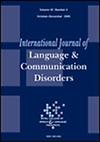The potential of cognitive remediation therapy for improving the communication capabilities of adults with schizophrenia and other psychotic spectrum disorders
Abstract
Background
Impairment in aspects of communication is a core diagnostic feature of schizophrenia and other psychotic spectrum disorders. These communication difficulties inhibit participation in a range of daily activities and affect relationships and quality of life. There has been little research focussed on communication outcomes in relation to cognitive remediation therapy within this population. Data collected as part of an implementation trial of the Computerised Interactive Remediation of Cognition and Thinking Skills (CIRCuiTS) program provided an opportunity to examine the potential for changes in communication capability to support activities of daily living.
Aim
To survey changes in ratings of aspects of communication capability of adults with schizophrenia who completed the CIRCuiTS cognitive remediation therapy program.
Methods & Procedures
Thirty adults with schizophrenia and other psychotic spectrum disorders completed the CIRCuiTS therapy program as part of an implementation trial in 2018 and 2019. Most participants were male (93%) and inpatients at Bloomfield Hospital (73%) in Orange, New South Wales. Ratings on the Adaptive Behaviour Assessment System, Third Edition (ABAS3) were returned before and after completion of the CIRCuiTS program. The magnitude of changes in ABAS3 indices, the Communication scale and Functional academics scales were assessed between time points.
Outcomes & Results
Participants’ mean adaptive functioning indices prior to the CIRCuiTS program were in the extremely low range (∼second percentile) and increased to the low range (∼seventh percentile) following this therapy, achieving large mean effect sizes (Cohen's d = 0.92–1.24). Significant improvements in functioning were observed on the ABAS3 Communication and Functional Academics scales, with large mean effect sizes on both scales (Cohen's d = 1.09 and 0.99 respectively). Improvements in ratings occurred on items including initiating conversations, talking and listening over longer periods, explaining more complex information, using lists and reminders and a schedule or diary, completing written forms and personal money management.
Conclusions & Implications
Most participants were observed to make gains in aspects of communication. The results point to these aspects of communication as potential future targets for therapy with people with schizophrenia and other psychotic spectrum disorders. This study highlights the value and role of Speech and Language Therapists in cognitive remediation therapy. Further research seems warranted with participants with a broader range of demographic, clinical and functional capabilities, that controls for the effects of medications and other therapeutic interventions and utilises a more comprehensive assessment of communication.
WHAT THIS PAPER ADDS
What is already known on the subject
- People with schizophrenia and other psychotic spectrum disorders experience impairment in cognitive functioning as well as communication capability that affects their daily functioning and quality of life. Cognitive remediation therapy has been shown to improve aspects of the daily functioning of people with schizophrenia and other psychotic spectrum disorders and is recommended in international treatment guidelines. However, very little research has been conducted to investigate the effectiveness of this therapy in addressing communication difficulties.
What this paper adds to existing knowledge
- The present study found participants with schizophrenia and other psychotic spectrum disorders made significant improvements in important aspects of communication after completing the Computerised Interactive Remediation of Cognition and Thinking Skills cognitive remediation therapy program. The results point to the potential of cognitive remediation therapy as a therapeutic approach that is likely to improve communication capability.
What are the potential or actual clinical implications of this work?
- Cognitive remediation therapy is likely to be an important treatment for improving the communication capabilities of people with severe mental illness. This relatively new area of clinical practice and research highlights the value and potential of speech and language therapy in improving the communication capabilities of people with schizophrenia and other psychotic spectrum disorders.

 求助内容:
求助内容: 应助结果提醒方式:
应助结果提醒方式:


